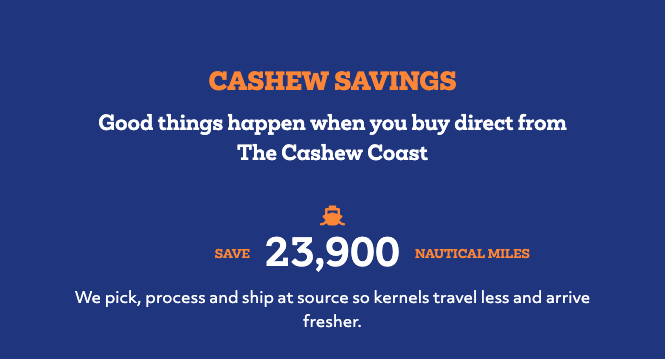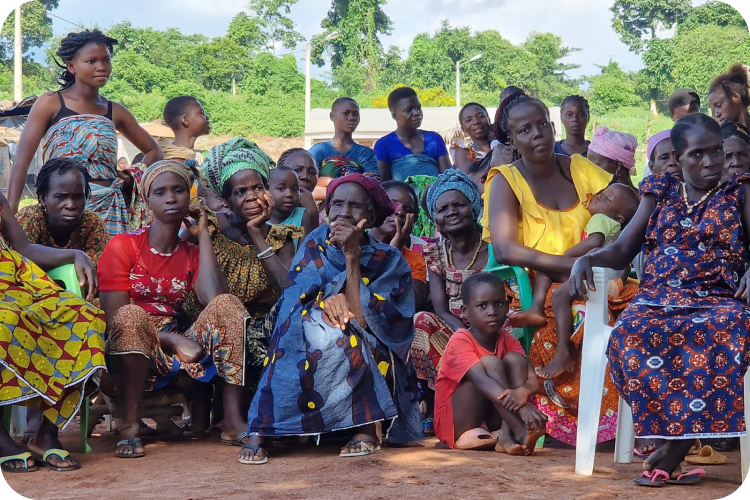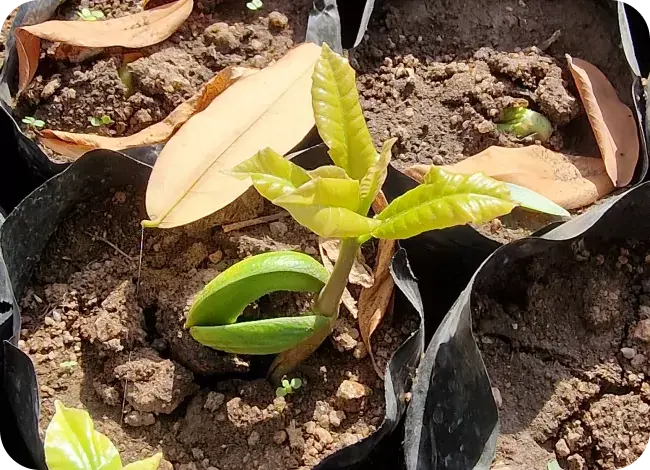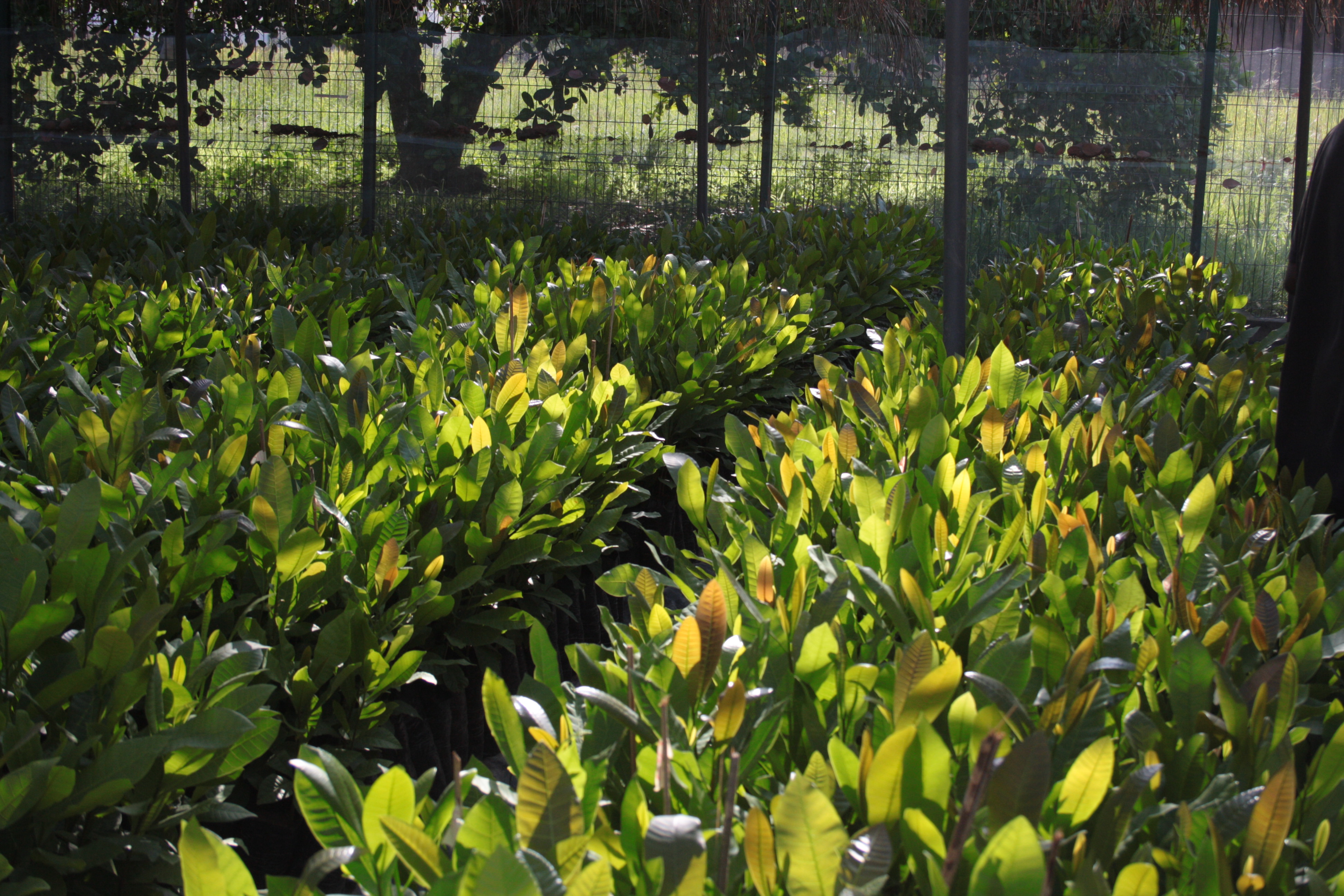Based in Côte d'Ivoire, Cashew Coast has taken innovative steps to address sustainability issues while delivering premium organic cashews to the global market.
By processing cashews locally, investing in climate-resilient agriculture, and ensuring traceability from farm to fork, Cashew Coast offers a scalable, sustainable alternative to the traditional export-dependent model.
The Environmental Impact
One of the biggest challenges in the cashew industry is the environmental impact of traditional processing methods and extended supply chains.

At Cashew Coast, we've tackled this by processing our cashews locally. Shunning the common practice of shipping raw cashews to Asia for processing, we shell and process our nuts near the farms where they're grown. This significantly reduces our carbon footprint and food miles, aligning with our commitment to environmental sustainability.
One of the by-products of cashew nuts processing is cashew nut shell liquid (CNSL). It is a highly corrosive substance that poses environmental risks such as soil and water contamination if not properly handled. However, when managed responsibly, CNSL can be extracted and used to produce biofuels, while the leftover shells can be converted into biochar.
To harness this potential, we’ve partnered with two companies to establish facilities with a combined capacity of 60,000 tons for CNSL extraction and biochar production. These initiatives are expected to be operational by 2027.
Social Initiatives & Female Empowerment

Another critical challenge is ensuring fair labour practices and supporting local communities. The cashew industry has historically faced issues with worker exploitation and low wages. In certain regions of Asia and Africa, manual shelling remains a concern due to exposure to CNSL which can cause severe skin burns and respiratory issues to workers. For that reason, our processing method relies entirely on mechanical shelling, eliminating direct contact and ensuring worker safety with protective equipment, and steam Processing instead of roasting or boiling, to prevent harmful fumes and maintain a safer work environment.
At Cashew Coast, we've made it our mission to empower local communities, particularly women.
Three-quarters of our employees are women, including over 40% of our management team. Over 80% of our staff is on permanent contracts (against 15% in the industry in Côte d'Ivoire according to a 2024 report by Fairmatch).
On the production side, we are committed to long-term partnerships with farming communities through a range of supportive initiatives. We always uphold the state-mandated minimum price and purchase their entire harvest—even when quality fluctuates—because we believe in standing by our partners, not just when times are good. Our support includes agronomy training programmes, helping farmers replace ageing or dead trees with new seedlings from our nursery, and installing water pumps in villages to ease the burden of water collection, especially for women.
By providing meaningful employment and fair wages, we're producing a better product and contributing to our region's socio-economic development.
Maintaining high-quality standards while adhering to organic practices can be costly, but we consider it an essential investment. Our approach involves working closely with local farmers, providing them with training and financial support to improve yield and quality. This ensures a consistent supply of premium cashews and supports sustainable farming practices.
A Transparent Supply Chain
We're also addressing the challenge of transparency in the supply chain.
The cashew industry often involves complex, opaque networks of middlemen. At Cashew Coast, we've established direct relationships with our farmers, allowing us to trace our cashews from farm to fork using SAP RSM system.
This transparency assures our customers of our product's quality and ethical sourcing and enables us to support our farming communities better.
Sustainable Innovations
Innovation plays a key role in our sustainability efforts. We're constantly exploring ways to reduce waste and maximise resource efficiency. For instance, we're investigating the potential of using cashew shells as a renewable energy source, turning what was once considered waste into a valuable resource.
Cashew shells are rich in carbon and contain CNSL (Cashew Nut Shell Liquid), which can be extracted for biofuel or used to generate steam and energy through gasification, pyrolysis, or biochar production.
Our projects include:
- CNSL extraction for biofuel
- Turning shells into biochar
- Using rejects (i.e. damaged kernels) as animal feed
- Transforming cashew skin (testa) into nutrient-rich compost
Our commitment to sustainability extends beyond our immediate operations, and we're actively promoting biodiversity in our farming regions. For instance, our dedicated tree nursery has plants, grafts, and donates around 10,000 climate-resilient cashew trees to our farmers every year, supporting the long-term sustainability of cashew farming in the face of climate change.
Our Continued Commitment to Progress

At Cashew Coast, sustainability and quality go hand in hand. We can produce delicious, ethically and sustainably sourced cashews by investing in our communities, implementing environmentally friendly practices, and maintaining rigorous standards.
The challenges in the cashew industry are significant, but they're not insurmountable. Through our integrated approach to sustainability – encompassing environmental, social, and economic factors – we're proving that it's possible to produce high-quality, organic cashews while positively impacting our communities and environment. As we continue to grow and innovate, we remain committed to setting new standards for sustainability in the cashew industry.
A Groundbreaking Project in Collaboration with Some Remarkable Partners
Led by Dr. Angel Avadí from CIRAD, renowned for their expertise in tropical agricultural chains and Life Cycle Assessments, we’ve teamed up with Agropolis Fondation and Cultivating New Frontiers in Agriculture (CNFA) to revolutionise sustainability in the cashew sector.
What's the project about?
We're building innovative tools to measure our contribution to sustainable development. These tools will help us track environmental and socio-economic factors, identifying and valuing both positive and negative impacts on ecosystem services associated with cashew production, from the field to the processing plants.
Duration & resources
Called DuraCajou, the project included a 10-month research phase led by a dedicated team of four full-time experts, laying the groundwork for a broader sustainability initiative.. We are now eagerly awaiting the publications. An even larger project is ongoing, led by expert in-house researchers involved in this initial project. We’re in this for the long haul and are committed to delivering meaningful results.
The result?
An upcoming comprehensive sustainability dashboard, including key indicators. We're determined to communicate our pro-sustainability efforts effectively and make a positive impact.
A comprehensive effort
This project is a comprehensive effort to account for our responsibility to the planet. We believe in sustainability and are willing to do the work to prove it.
Transparency
We're on a mission to set a new standard for transparency in the cashew industry. That's why we've partnered with strong, independent French research institutions. Their rigorous scrutiny ensures the highest standards, and the results will be available to the public.
We're proud to be part of this mission to promote sustainable development and a greener future for cashew production. Stay tuned for updates as we work towards a more eco-friendly and socially responsible cashew industry! 🌏

You can find out more here:
- Cashews and Sustainability: A Turning Point in 2024
- 2024: A Pivotal Year for the Cashew Nut Industry's Role in Sustainability
- Cashews: Optimistic Outlook 2024
- Cashew Market Overview in Q1 2024: Promising with High Potential
- Côte d'Ivoire Cashew Industry Short of 60,000T to Sustain 2024 Operations
- Binh Phuoc Cashew Industry: Overcoming Difficulties Towards a Sustainable Development Future
- Aldi Announces Collaboration to Support Sustainable Cashew Supply Chain
- Aldi Teams Up with Cashew Coast to Crack Sustainable Nut Supply




